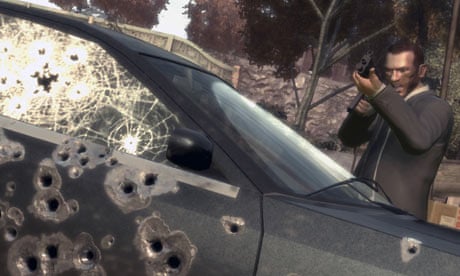The recent release of Grand Theft Auto 5 and the discovery that the Washington Navy Yard gunman was "obsessed with violent video games" has led to yet another series of media claims that video games cause violence.
There has never been any satisfactory scientific evidence for the association between video games and violent behaviour, but a recent study has revealed that baseless claims from the media that video games cause violence actually do cause violence
Dr Mario Vance, a psychological researcher at the Rapture Institute for headline-inspired science, conducted a seven-year longitudinal study that monitored the anger levels of more than a thousand volunteers from gaming communities. The results showed statistically significant increases in overall aggression and violent tendencies that occurred very soon after tenuous mainstream media stories claiming video games cause violence.
"Mainstream media have never liked video games, but it's just getting silly lately," said Dr Vance. "Recently, several media sources focused on Aaron Alexis (the Washington naval yard gunman) and his enthusiasm for Call of Duty as a cause for his brutal crimes. Because when wondering what could have made a naval reservist, someone trained by the military to engage in actions with the express intention of killing people, turn to violence, the obvious conclusion is 'video games', apparently.
"A bias is one thing, but turning a brutal and deadly shooting into an excuse to attack a tenuously linked entertainment medium? That borders on pathological."
Dr Vance and his colleagues assessed daily reports submitted by willing gamers as to their aggression levels and violent tendencies, and over 90% of subjects reported dramatic increases in anger and violent inclinations whenever they viewed a news story that associated video games and violent behaviour. The remaining subjects were not included as they were typically too busy punching walls or screaming incoherent threats at traffic.
"The media's main concern appears to be that enthusiastic gamers can't differentiate between games and the real world, so violent games will result in violent behaviour. But anyone who has the cognitive faculties to purchase, set up and operate modern games consoles won't have trouble differentiating between a cartoonish fantasy world and reality."
When asked whether the self-reporting system used in his research is the best approach, Dr Vance admitted that it was not without issues.
"Yes, you're relying on the subjective assessment of individuals as to their own mental state, so there will be concerns about reliability. But it's very hard to assess this sort of thing in the lab. We tried, but kept getting subject effects, demand effects and the like, where people taking part in the experiment knew they were taking part in an experiment, so behaved differently. Basically, people's ability to differentiate between fact and fiction disrupted our experiment into whether they could differentiate between fact and fiction."
Despite there being no evidence that video game players struggle to separate fiction and reality, many media sources keep insisting that this is the case, a situation Dr Vance describes as "depressingly ironic".
Dr Vance's co-researcher Dr Freeman was unavailable for comment.
Matthew Bryant, a 28-year-old marketer from Crewe and participant in the research, claims that video games have the opposite effect to what is claimed by the media.
"Last week we had a three-hour meeting where my boss berated the entire department for not using 'synergy'. I asked him what that meant exactly and I'm now on report for insubordination. After that I spent about five hours hacking up virtual zombies with virtual blunt instruments, and felt a lot less like I wanted to strangle my boss with that stupid school tie he wears, which is identical to the one the managing director has."
Another participant, Kerry Goodliff, a 16-year-old student, said the media reporting of video games has affected her directly.
"I used to enjoy multiplayer gaming. Granted, it expanded my vocabulary for homophobic insults considerably, but I've never felt the urge to travel to war-torn regions and practise my sniper skills for real. But my mother read that I could turn violent so confiscated my Playstation. One dubious article in the Telegraph and she decides I'm too impressionable. She owns four Derek Acorah DVDs and keeps asking her fortune teller what to do about me, so yeah, I'm the main problem here."
But several parent concern groups maintain that the violent content of video games is unsuitable for young people, and children should be encouraged to try more traditional means of entertainment, like the plays of Shakespeare (eg teen murder/suicide drama Romeo and Juliet, or mass family slaughter epic Hamlet) or the cinema, where nothing violent is ever shown.
Roy Parker, a father of three from Devon, argues that video games should be banned entirely.
"It's ridiculous that they're even allowed. I don't want my children growing up in a world where horrible stuff like that is just out there where anybody can come across it and be damaged by it."
Mr Parker later left a comment on the Daily Mail website, arguing that the death penalty should be reinstated for immigrants and anyone with the audacity to be poor.
Dean Burnett is a casual video gamer. When he's not doing back flips through Aztec temples, he is on Twitter, @garwboy








Comments (…)
Sign in or create your Guardian account to join the discussion